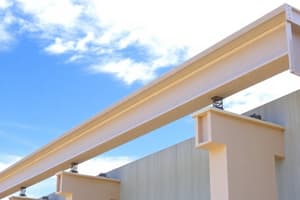Podcast
Questions and Answers
The computation of short-term or instantaneous deflections is conveniently done by using ______ theorems.
The computation of short-term or instantaneous deflections is conveniently done by using ______ theorems.
Mohr's
Prestressed concrete beam behaves in a manner similar to that of a ______ concrete beam in the post-cracking stage.
Prestressed concrete beam behaves in a manner similar to that of a ______ concrete beam in the post-cracking stage.
reinforced
Short-term or instantaneous deflections of prestressed members are governed by the ______ moment distribution along the span.
Short-term or instantaneous deflections of prestressed members are governed by the ______ moment distribution along the span.
bending
[Blank] area theorems are readily applicable for the estimation of deflections due to the prestressing force, self-weight and imposed loads.
[Blank] area theorems are readily applicable for the estimation of deflections due to the prestressing force, self-weight and imposed loads.
Tendons are located with eccentricities towards the ______ of beams to counteract the sagging bending moments due to transverse loads.
Tendons are located with eccentricities towards the ______ of beams to counteract the sagging bending moments due to transverse loads.
The prestressing force has a significant impact on ______ of prestressed members.
The prestressing force has a significant impact on ______ of prestressed members.
The computation of deflections in the post-cracking stage is made by considering ______-curvature relationships.
The computation of deflections in the post-cracking stage is made by considering ______-curvature relationships.
The limit state approach is used to determine the ______ of structures under various loads.
The limit state approach is used to determine the ______ of structures under various loads.
The effects of prestressing force on structures include changes in ______.
The effects of prestressing force on structures include changes in ______.
The tendon profile has a significant impact on the ______ of prestressed beams.
The tendon profile has a significant impact on the ______ of prestressed beams.
Flashcards are hidden until you start studying
Study Notes
Importance of Control of Deflections
- Adequate stiffness in structural concrete is essential to limit deflections at working loads, as excessive deflections can affect both strength and serviceability.
- Excessive sagging in structural members can lead to aesthetic issues and may render floors unsuitable for their intended use.
- Large deflections under dynamic loads create discomfort for users of the structure.
- Significant deflections can cause damage to finishes, partitions, and associated supporting structures.
Factors Influencing Deflections
- Deflections of prestressed concrete members are primarily influenced by:
- Imposed load and self-weight.
- Magnitude of the prestressing force.
- Cable profile and its arrangement.
- Second moment of area of the cross-section.
- Modulus of elasticity of concrete.
- Shrinkage, creep, and relaxation of steel stress.
- Span length of the member.
- Fixity conditions at the supports.
Behavior of Prestressed Concrete
- In the pre-cracking stage, whole cross-section contributes to deflection calculations using the second moment of area of the gross concrete section.
- Serviceability in prestressed concrete members is critical and parallels reinforced concrete design, emphasizing the need to control deflections effectively, particularly at cracking.
- Primary design concerns include flexural stress limits and failure modes in flexure, shear, and torsion.
Long-term Deformation Concerns
- Prestressed concrete members face sustained eccentric compression affecting their creep deformation over time.
- Poor prediction of long-term deformation can lead to issues such as:
- Reverse deflections causing improper drainage on roofs.
- Uncomfortable conditions in bridges or aqueducts.
- Cracking or misalignment in building partitions, windows, and doors.
Short-term Deflections Computation
- Short-term deflections occur just after prestress transfer and during load application.
- Use of Mohr’s theorems facilitates convenient computation of these instant deflections.
- Mohr's moment area theorems apply to estimate deflections caused by prestressing force, self-weight, and imposed loads.
Tendon Profile Effects
- Tendons in prestressed beams are typically placed eccentrically towards the beam soffit to counteract sagging moments resulting from transverse loads.
Studying That Suits You
Use AI to generate personalized quizzes and flashcards to suit your learning preferences.





